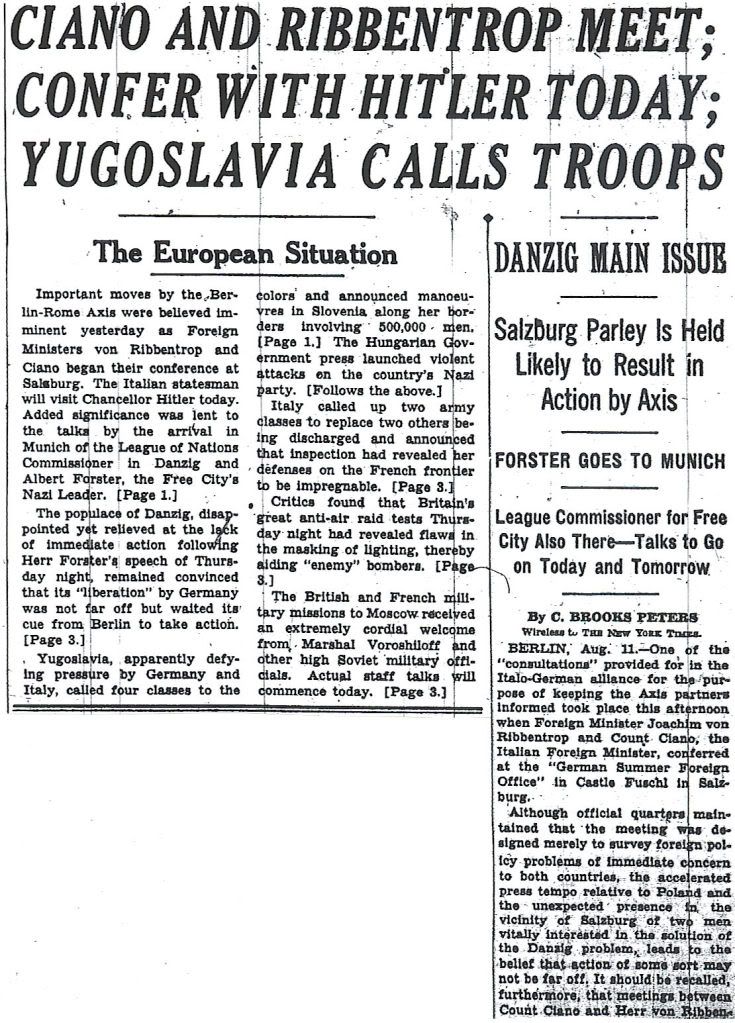
Posted on 08/12/2009 6:43:39 AM PDT by Homer_J_Simpson

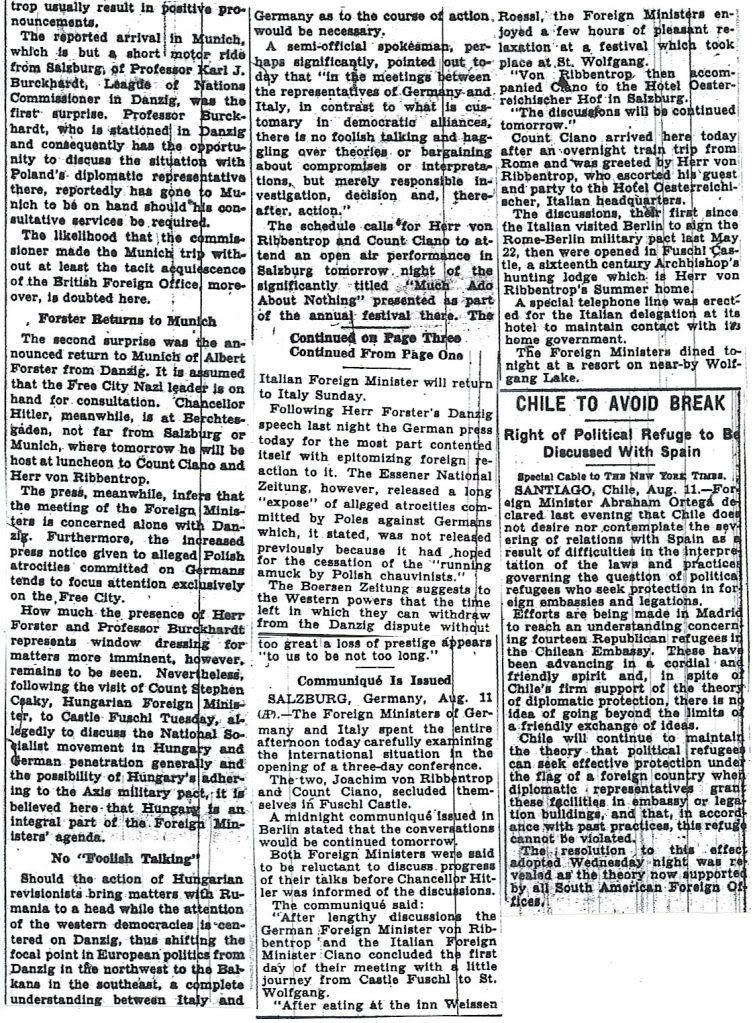
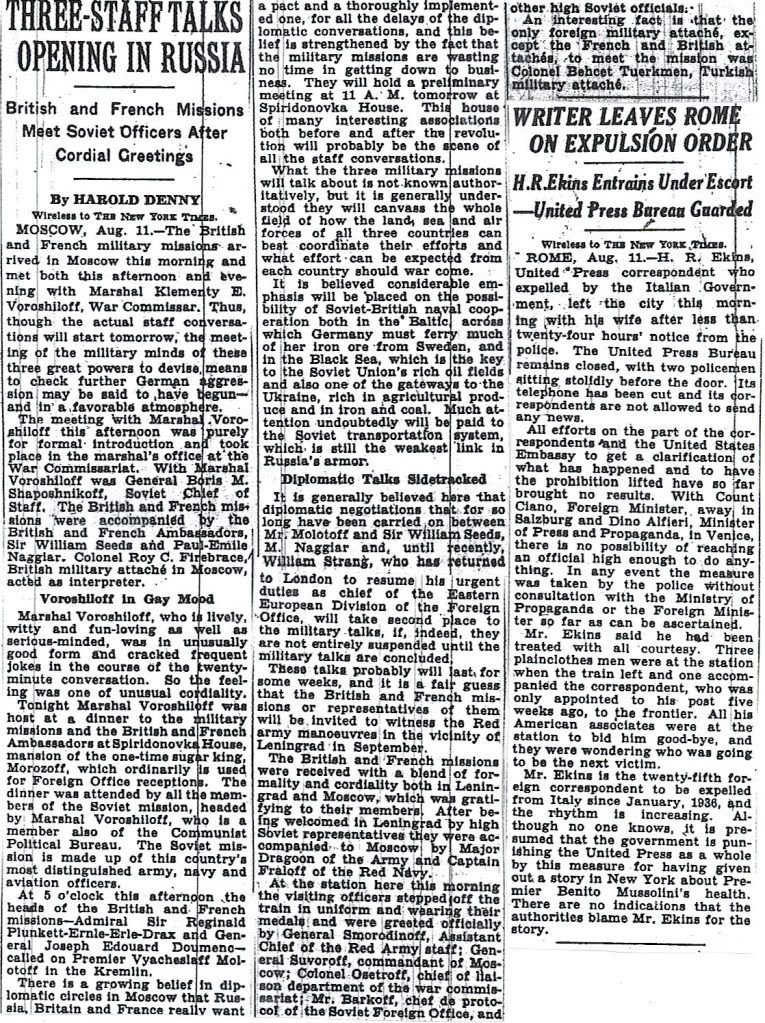
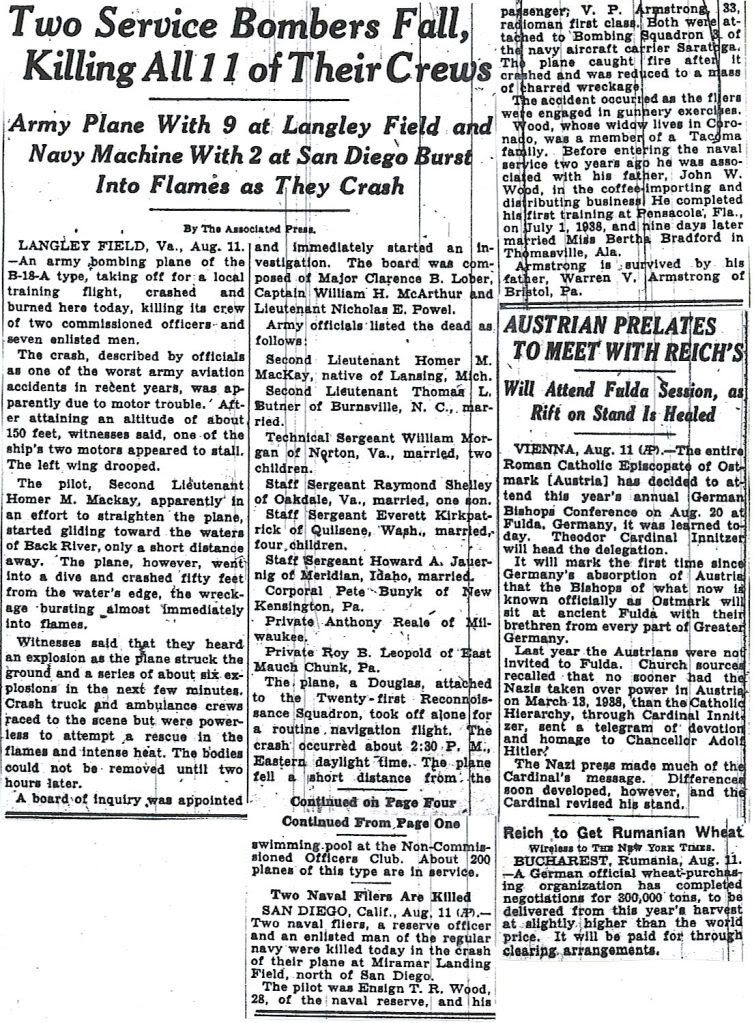
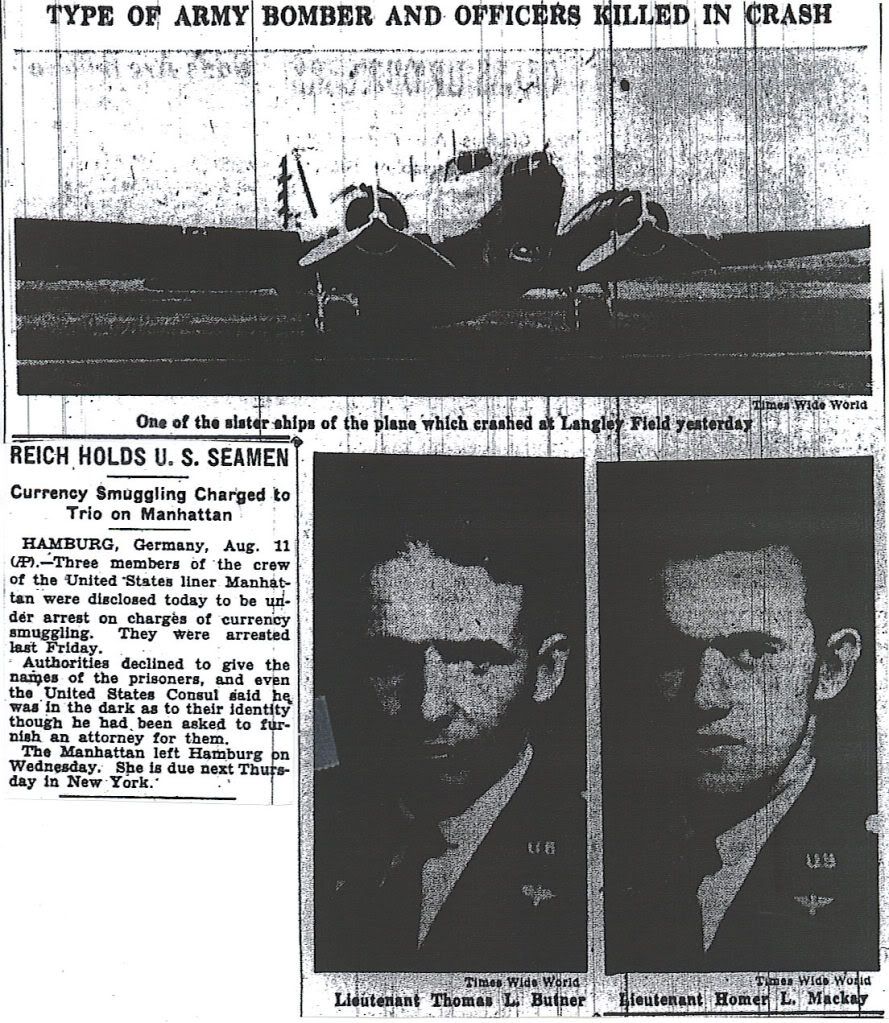
Had to laugh at “Voroshiloff In Gay Mood.”
Ciano moved on to Obersalzberg, where Hitler during two meetings on August 12 and 13 reiterated that France and Britain would not fight. In contrast to the Nazi Foreign Minister, the Fuehrer was cordial, but he was equally implacable in his determination to go to war. This is evident not only from Ciano’s reports but from the confidential German minutes of the meeting, which are among the captured documents. The Italian Minister found Hitler standing before a large table covered with military staff maps. He began by explaining the strength of Germany’s West Wall. It was, he said, impenetrable. Besides, he added scornfully, Britain could put only three divisions into France. France would have considerably more, but since Poland would be defeated “in a very short time,” Germany could then concentrate 100 divisions in the west “for the life-and-death struggle which would then commence.”
But would it? A few moments later, annoyed by Ciano’s initial response, the Fuehrer was contradicting himself. The Italian Minister, as he had promised himself, spoke up to Hitler. According to the German minutes, he expressed “Italy’s great surprise at the entirely unexpected gravity of the situation.” Germany, he complained, had not kept her ally informed. “On the contrary,” he said, “the Reich Foreign Minister had stated [at Milan and Berlin in May] that the Danzig question would be settled in due course.” When Ciano went on to declare that a conflict with Poland would spread into a European war his host interrupted to say that he differed.
“I personally,” said Hitler, “am absolutely convinced that the Western democracies will, in the last resort, recoil from unleashing a general war.” To which Ciano replied (the German minutes add) “that he hoped the Fuehrer would prove right but he did not believe it.” The Italian Foreign Minister then outlined in great detail Italy’s weaknesses, and from his tale of woe, as the Germans recorded it, Hitler must have been finally convinced that Italy would be of little help to him in the coming war. One of Mussolini’s reasons, Ciano said , for wanting to postpone the war was that he “attached great importance to holding, according to plan, the World Exhibition of 1942” – a remark that must have astounded the Fuehrer, lost as he was in his military maps and calculations. He must have been equally astounded when Ciano naively produced the text of a communiqué, which he urged to be published, stating that the meeting of the Axis ministers had “reaffirmed the peaceful intentions of their government” and their belief that peace could be maintained “through normal diplomatic negotiations.” Ciano explained that the Duce had in mind a peace conference of the chief European nations but that out of deference to “the Fuehrer’s misgivings” he would settle for ordinary diplomatic negotiations.
Hitler did not, the first day, turn down completely the idea of a conference but reminded Ciano that “Russia could no longer be excluded from future meetings of the powers.” This was the first mention of the Soviet Union but it was not the last.
Finally when Ciano tried to pin his host down as to the date of the attack on Poland Hitler replied that because of the autumn rains, which would render useless his armored and motorized divisions in a country with few paved roads, the “settlement with Poland would have to be made one way or the other by the end of August.”
At last Ciano had the date. Or the last possible date, for a moment later Hitler was storming that if the Poles offered any fresh provocation he was determined “to attack Poland within forty-eight hours.” Therefore, he added, “a move against Poland must be expected any moment.” That outburst ended the first day’s talks except for Hitler’s promise to think over the Italian proposals.
Toward the end of the meeting with Ciano on August 12, a “telegram from Moscow,” as the German minutes put it, was handed to the Fuehrer. The conversation was interrupted for a few moments while Hitler and Ribbentrop perused it. They then informed Ciano of its contents.
“The Russians,” Hitler said, “have agreed to a German political negotiator being sent to Moscow.” (To be continued.)
William L. Shirer, The Rise and Fall of the Third Reich
Ciano moved on to Obersalzberg, where Hitler during two meetings on August 12 and 13 reiterated that France and Britain would not fight. In contrast to the Nazi Foreign Minister, the Fuehrer was cordial, but he was equally implacable in his determination to go to war. This is evident not only from Ciano’s reports but from the confidential German minutes of the meeting, which are among the captured documents. The Italian Minister found Hitler standing before a large table covered with military staff maps. He began by explaining the strength of Germany’s West Wall. It was, he said, impenetrable. Besides, he added scornfully, Britain could put only three divisions into France. France would have considerably more, but since Poland would be defeated “in a very short time,” Germany could then concentrate 100 divisions in the west “for the life-and-death struggle which would then commence.”
But would it? A few moments later, annoyed by Ciano’s initial response, the Fuehrer was contradicting himself. The Italian Minister, as he had promised himself, spoke up to Hitler. According to the German minutes, he expressed “Italy’s great surprise at the entirely unexpected gravity of the situation.” Germany, he complained, had not kept her ally informed. “On the contrary,” he said, “the Reich Foreign Minister had stated [at Milan and Berlin in May] that the Danzig question would be settled in due course.” When Ciano went on to declare that a conflict with Poland would spread into a European war his host interrupted to say that he differed.
“I personally,” said Hitler, “am absolutely convinced that the Western democracies will, in the last resort, recoil from unleashing a general war.” To which Ciano replied (the German minutes add) “that he hoped the Fuehrer would prove right but he did not believe it.” The Italian Foreign Minister then outlined in great detail Italy’s weaknesses, and from his tale of woe, as the Germans recorded it, Hitler must have been finally convinced that Italy would be of little help to him in the coming war. One of Mussolini’s reasons, Ciano said , for wanting to postpone the war was that he “attached great importance to holding, according to plan, the World Exhibition of 1942” – a remark that must have astounded the Fuehrer, lost as he was in his military maps and calculations. He must have been equally astounded when Ciano naively produced the text of a communiqué, which he urged to be published, stating that the meeting of the Axis ministers had “reaffirmed the peaceful intentions of their government” and their belief that peace could be maintained “through normal diplomatic negotiations.” Ciano explained that the Duce had in mind a peace conference of the chief European nations but that out of deference to “the Fuehrer’s misgivings” he would settle for ordinary diplomatic negotiations.
Hitler did not, the first day, turn down completely the idea of a conference but reminded Ciano that “Russia could no longer be excluded from future meetings of the powers.” This was the first mention of the Soviet Union but it was not the last.
Finally when Ciano tried to pin his host down as to the date of the attack on Poland Hitler replied that because of the autumn rains, which would render useless his armored and motorized divisions in a country with few paved roads, the “settlement with Poland would have to be made one way or the other by the end of August.”
At last Ciano had the date. Or the last possible date, for a moment later Hitler was storming that if the Poles offered any fresh provocation he was determined “to attack Poland within forty-eight hours.” Therefore, he added, “a move against Poland must be expected any moment.” That outburst ended the first day’s talks except for Hitler’s promise to think over the Italian proposals.
Toward the end of the meeting with Ciano on August 12, a “telegram from Moscow,” as the German minutes put it, was handed to the Fuehrer. The conversation was interrupted for a few moments while Hitler and Ribbentrop perused it. They then informed Ciano of its contents.
“The Russians,” Hitler said, “have agreed to a German political negotiator being sent to Moscow.” (To be continued.)
William L. Shirer, The Rise and Fall of the Third Reich
Three-Staff Talks Opening in Russia – 3
Two Service Bombers Fall, Killing All 11 of Their Crews – 4-5
Ciano at Salzburg update at reply #3.
"Marshal Voroshiloff, who is lively, witty and fun-loving as well as serious-minded, was in unusually good form and cracked frequent jokes in the course of the twenty-minute conversation."
Q: How many Poles does it take to change a light bulb?
A: What Poles??!!
Ha! He's got a million of 'em.
“In Soviet Union, radio listens to you.”
Sourced largely from Wikipedia
The B-18 (or Bolo) was a modified DC-2, and was largely outdated by the time the US entered WWII. It did have a somewhat successful war career as a coastal patrol - ASW aircraft.
Disclaimer: Opinions posted on Free Republic are those of the individual posters and do not necessarily represent the opinion of Free Republic or its management. All materials posted herein are protected by copyright law and the exemption for fair use of copyrighted works.